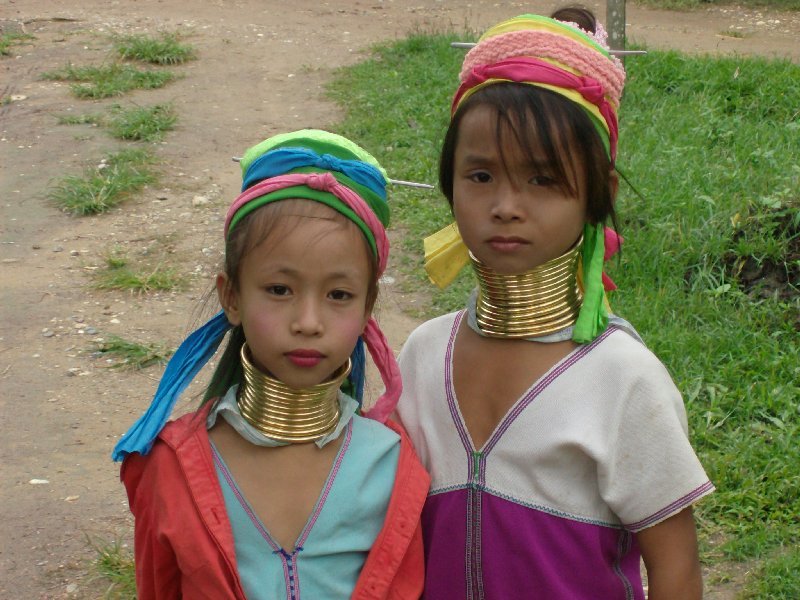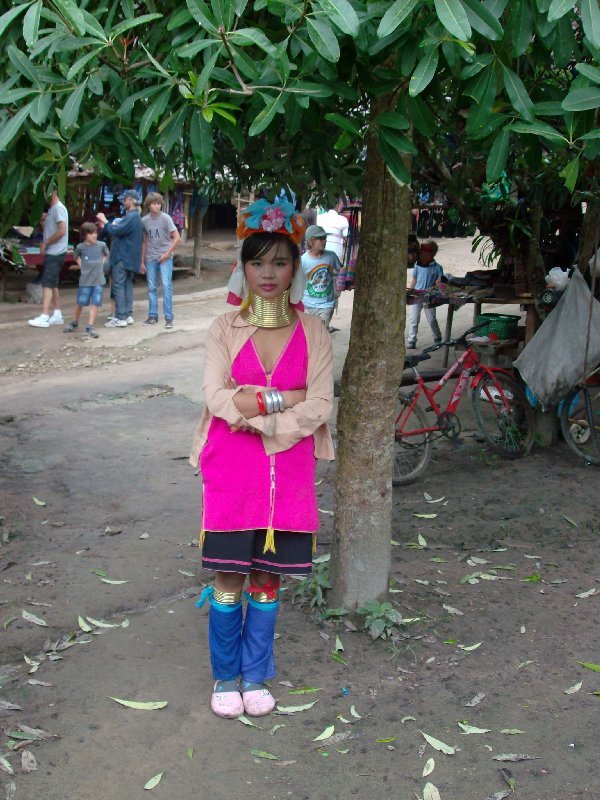A
alan crisp
Guest
'Human Zoo' in Thailand Puts Long-Necked Burmese Women on Display
"It's incredible," says a Canadian tourist, snapping away with his camera, as the women pose - heads bobbing stiffly far above their shoulders - and try to sell him a few souvenirs from the doorsteps of their bamboo huts.
It is hard not to stare. At the end of a dirt track, deep in the Thai jungle, a group of 'long-necked' Kayan women sit in the shade, fingering the coils of brass which snake tightly around their unnaturally long, giraffe-like necks.
For years the prospect of visiting one of three "long-necked" Kayan villages in this remote corner of north-western Thailand, close to the Burmese border, has been a major lure for foreign tourists.
In return, the visitors have helped to provide a very modest income for the Kayan women and their families, who are all refugees from Burma.
Boycott?
But in a dramatic intervention, the United Nations is now talking of the need for a tourism boycott, amid allegations that the Kayan are being trapped in a "human zoo".
The United Nations refugee agency (UNHCR) says that for the past two years, the Thai authorities have refused to allow a group of 20 Kayan to leave the country, despite firm offers to resettle them in Finland and New Zealand.
The suspicion is that the women are being kept in Thailand because of the central role they play in the local tourism industry.
"We don't understand why these 20 are not allowed to start new lives," said the UNHCR's regional spokeswoman, Kitty McKinsey.
"The Thai authorities are treating them in a special way," she argued, pointing out that some 20,000 other Burmese refugees had recently been allowed to move to third countries.
"It's absolutely a human zoo," she said. "One solution is for tourists to stop going."
At the centre of this increasingly heated dispute is a quietly determined 23-year-old woman called Zember, who has proudly worn her tribe's traditional neck rings since she was five.
Zember and her family fled their home in the hills of eastern Burma 18 years ago. Her mother, Mu Pao, remembers government troops raiding their village and taking the men away by force to work as porters.
Like tens of thousands of people, the Kayan headed for the Thai border. But instead of being kept with the other refugees, the "long-necked" families were put in a separate compound a few yards from the official camp.
Since then, the ethnic conflicts inside Burma have raged on, and the Kayan community in Thailand has swelled to about 500.
"At least we're safe here and we can earn some money," said Mu Pao. Each tourist pays a 250 baht (US$8; £4) entrance fee.
Better deal
Other older women in the village agreed that, with little hope of ever returning to Burma, earning 1500 baht a month to be stared at by tourists was an acceptable deal.
But in 2005, a far better deal emerged. The UNHCR began offering permanent resettlement abroad to the many thousands of refugees still living in the area.
Many of the Kayan applied, and Zember and her family were quickly told they'd been accepted.
"I was so happy," said Zember. "They tell me a house is already waiting for us in New Zealand."
For the past two years, however, the Thai authorities have refused to sign the paperwork needed for Zember and 19 others to leave the country.
"Actually they aren't refugees," said Wachira Chotirosseranee, the deputy district officer and refugee camp commander, who insisted this was a purely bureaucratic matter with no connection to the local tourism industry.
"According to the regulations, you have to live inside the refugee camp. They don't meet the criteria."
The Thai authorities argue that the Kayan are economic migrants who earn a good living from the tourist trade and have chosen to settle outside the refugee camps.
"They absolutely are refugees," said the UNHCR's Kitty McKinsey. "It comes as a great surprise that the Thai authorities are criticising them for living outside the camps, when it was the Thai authorities who wanted them to live (outside)."
In frustration, and as an act of protest, Zember has now taken off her neck rings. "It felt uncomfortable at first," she said, rubbing her throat.
Over the years, the rings push the women's shoulders and ribs down, making their necks appear stretched.
"Because of my rings I have suffered many problems," she said. "I wear them not for tourists. I wear them for tradition... Now I feel like a prisoner."
BBC NEWS | Asia-Pacific | Burmese women in Thai 'human zoo'
"It's incredible," says a Canadian tourist, snapping away with his camera, as the women pose - heads bobbing stiffly far above their shoulders - and try to sell him a few souvenirs from the doorsteps of their bamboo huts.
It is hard not to stare. At the end of a dirt track, deep in the Thai jungle, a group of 'long-necked' Kayan women sit in the shade, fingering the coils of brass which snake tightly around their unnaturally long, giraffe-like necks.
For years the prospect of visiting one of three "long-necked" Kayan villages in this remote corner of north-western Thailand, close to the Burmese border, has been a major lure for foreign tourists.
In return, the visitors have helped to provide a very modest income for the Kayan women and their families, who are all refugees from Burma.
Boycott?
But in a dramatic intervention, the United Nations is now talking of the need for a tourism boycott, amid allegations that the Kayan are being trapped in a "human zoo".
The United Nations refugee agency (UNHCR) says that for the past two years, the Thai authorities have refused to allow a group of 20 Kayan to leave the country, despite firm offers to resettle them in Finland and New Zealand.
The suspicion is that the women are being kept in Thailand because of the central role they play in the local tourism industry.
"We don't understand why these 20 are not allowed to start new lives," said the UNHCR's regional spokeswoman, Kitty McKinsey.
"The Thai authorities are treating them in a special way," she argued, pointing out that some 20,000 other Burmese refugees had recently been allowed to move to third countries.
"It's absolutely a human zoo," she said. "One solution is for tourists to stop going."
At the centre of this increasingly heated dispute is a quietly determined 23-year-old woman called Zember, who has proudly worn her tribe's traditional neck rings since she was five.
Zember and her family fled their home in the hills of eastern Burma 18 years ago. Her mother, Mu Pao, remembers government troops raiding their village and taking the men away by force to work as porters.
Like tens of thousands of people, the Kayan headed for the Thai border. But instead of being kept with the other refugees, the "long-necked" families were put in a separate compound a few yards from the official camp.
Since then, the ethnic conflicts inside Burma have raged on, and the Kayan community in Thailand has swelled to about 500.
"At least we're safe here and we can earn some money," said Mu Pao. Each tourist pays a 250 baht (US$8; £4) entrance fee.
Better deal
Other older women in the village agreed that, with little hope of ever returning to Burma, earning 1500 baht a month to be stared at by tourists was an acceptable deal.
But in 2005, a far better deal emerged. The UNHCR began offering permanent resettlement abroad to the many thousands of refugees still living in the area.
Many of the Kayan applied, and Zember and her family were quickly told they'd been accepted.
"I was so happy," said Zember. "They tell me a house is already waiting for us in New Zealand."
For the past two years, however, the Thai authorities have refused to sign the paperwork needed for Zember and 19 others to leave the country.
"Actually they aren't refugees," said Wachira Chotirosseranee, the deputy district officer and refugee camp commander, who insisted this was a purely bureaucratic matter with no connection to the local tourism industry.
"According to the regulations, you have to live inside the refugee camp. They don't meet the criteria."
The Thai authorities argue that the Kayan are economic migrants who earn a good living from the tourist trade and have chosen to settle outside the refugee camps.
"They absolutely are refugees," said the UNHCR's Kitty McKinsey. "It comes as a great surprise that the Thai authorities are criticising them for living outside the camps, when it was the Thai authorities who wanted them to live (outside)."
In frustration, and as an act of protest, Zember has now taken off her neck rings. "It felt uncomfortable at first," she said, rubbing her throat.
Over the years, the rings push the women's shoulders and ribs down, making their necks appear stretched.
"Because of my rings I have suffered many problems," she said. "I wear them not for tourists. I wear them for tradition... Now I feel like a prisoner."
BBC NEWS | Asia-Pacific | Burmese women in Thai 'human zoo'





